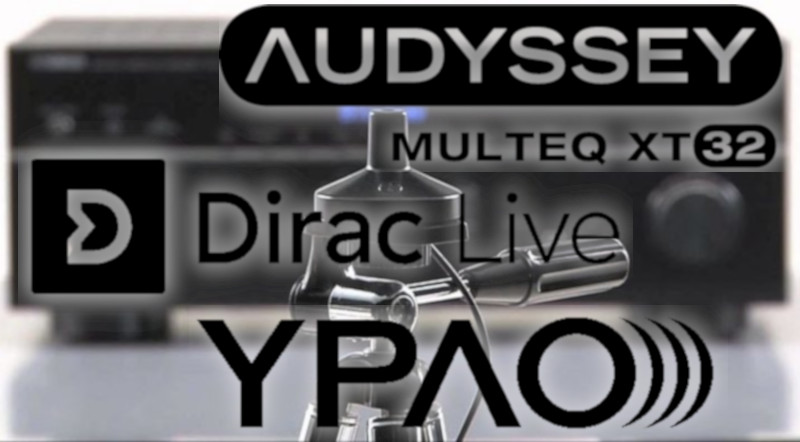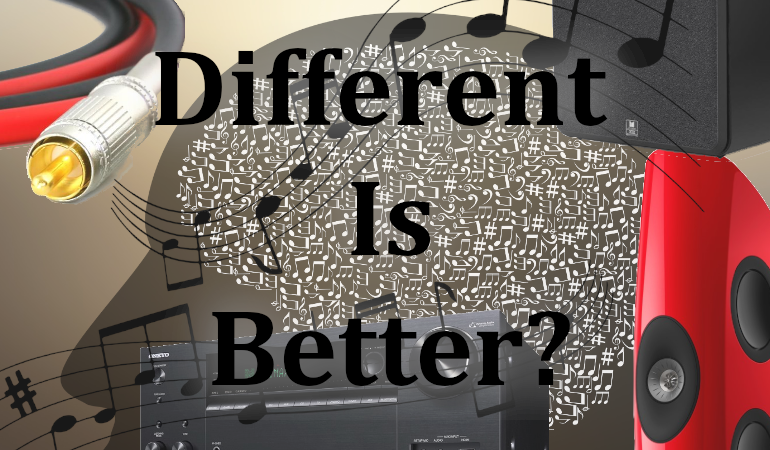Hearing a Difference After Upgrade: Different = Better?
I consider myself a well-educated AV Enthusiast. I regularly browse and contribute on forums, listen to AV podcasts, and write for an AV website. So you would think that I am impervious to all the claims that new amplifiers or other equipment upgrades will “totally change my system.” Well, for the most part, I am. But I will admit that I have bought and sold a wide variety of “audiophile” gear over the years. Always trying to get the very best sound.
Unfortunately, my reasonably new Denon X3600 died – don’t worry, Denon covered it under warranty. So I decided to use it as an excuse to upgrade to the Onkyo TX-NR7100. The X3600 and 7100 are nearly identical on paper, with similar power and features. So surely I shouldn’t notice any difference, right? As soon as I plugged it in and set it up, I messaged Rob H from AV Rant and said I thought the Onkyo was “cleaner sounding.”
What was I saying? Was I speaking in subjective terms like some pedantic audiophile? Sadly, I was. But Rob and my editor challenged me to look objectively at my setup and determine if what I was hearing was an actual change from the upgrade or confirmation bias – I did a thing, so I heard a thing. So here we are!
What Is Confirmation Bias?
So in simple terms, confirmation bias is the tendency to seek out, interpret, or judge information consistent with your beliefs. Ever buy something you were iffy on and then Google it afterward only to see that it had poor reviews? Did you return it, or did you go to page 4 of the results where it got a glowing review and feel better? That’s confirmation bias.

The issue with confirmation bias is that it is often not based on objective or measurable results. It relies very heavily on opinion, usually of others, to support your beliefs. “Audiophile-grade” speaker cables are the perfect example. I will often read posts about someone who claims they heard a significant difference when they upgraded to a new exotic speaker cable. Half of the replies are those crying out to see the objective tests of these cables, while the other half are owners of these same cables backing up the claims. So who do you think the person believes?
So Did I Hear A Difference?
Here is the million-dollar question. Yes, I think I did hear a difference, but it may not be for the reasons you think. So why did I hear a difference?
I Changed My Room Around
People often overlook how the layout of objects in a room will change the sound. For example, I recently changed my furniture around in my room, and it included getting a new, smaller sofa that was better centered and closer to my main listening position. The smaller sofa also sits further from a wall and exposes more of my acoustic panels than it did before. Additionally, I exposed more of my massive rug (a lot was hiding under my sectional) and moved it closer to the speakers, which covered more of my reflective floor.
I Changed My Surround Speakers
Because of how close my old sofa was to the walls, dipole speakers made sense, creating a more diffuse sound. When I moved my sofa closer, I could move my surround speakers behind and further away from me, rather than at a direct 90° to my seat. I purchased some used direct firing speakers on the cheap, so I swapped them out. While not overwhelming, I notice them far more than I did the dipole speakers. This also leads me to the next change.
I Changed Room Correction Software
So this is the most objective change in terms of measurements. My old Denon used Audyssey MultEQ XT32, and my new Onkyo TX-NR7100 has Dirac Live built-in. When I would run Audyessy in the past, it would typically set my right, center, and left channels somewhere around -5dB, and my surround and height speakers were between -3 and +2dB. Lastly, Audyssey set my single subwoofer to -5dB, which I goosed to -3dB because…bass! I should also note that my Denon completely automates Audyssey, only allowing me to tweak the final result.

With Dirac Live, I have more options at my fingertips. I have a calibrated UMIK-1 from Cross Spectrum Labs which is more accurate than the included microphone. I also have more measurement positions and I can upload different curves. So, if I liked a more bass-heavy curve, I can create that. And the curve that Dirac uses is different than Audyssey, so I am hearing that. I’m not saying that Dirac is better, what I am saying is that it is different. When I’ve just spent money on a new receiver, my brain is telling me that the difference is better. Is it? Only time will tell.
I Added A Second Subwoofer
So this is a no-brainer. Adding a second subwoofer helps you even out your bass response across your seats and room. I noticed an immediate difference in my in-room response when I got the second sub properly positioned, level matched, and calibrated. Movies hit harder, and bass was cleaner with music. So while I haven’t measured my room with Room EQ Wizard (REW) to see my new bass response, I know that a second subwoofer will make a meaningful change in most rooms, mine included.
Why I Don’t Trust My Ears
Listen, folks, I know that the new AV receiver isn’t the leading change. I altered too many things simultaneously that contributed to the change in my listening experience. So pointing what I heard all towards the Onkyo upgrade is silly. I changed my furniture, positioning, and speakers. Any one of these could have had an impact on my room. All of them together definitely impacted my listening experience. How do I find the source of my change?
I would have to change one thing at a time. That would mean I would need to return my room to its original configuration, set up and calibrate my Denon, and measure with REW. Next, I would do the same with my Onkyo. Then, I would need to systematically change one thing at a time. I’d need to set up each AV receiver in turn, recalibrating and measuring with REW, and meticulously comparing those results. Or, I could save myself an entire weekend of measurements, knowing that I was hearing the cumulative impact of all of my changes and upgrades. That they all added to my experience. Cumulatively, they created better sound in my room.
Is it important that the Onkyo was the driving force? No. I needed a receiver that worked and I now have one. Making that change gave me the motivation to change other things that also needed upgrading. I’m just thrilled that my room sounds better!
Our Take
Let’s face it, we all want confirmation that we didn’t waste our money on a silly purchase. And it’s easy to get swept up in all of the subjective rhetoric on online forums – I have done it myself. Just be aware that unless you are willing to invest in some room measurement software and equipment and are ready to play sweeps and measure endlessly, all you will have is subjective results.
The key is to realize that while your upgrade may have been a part of what you hear, there are probably more factors in play. If you changed anything else, if you moved something around, these can all affect the sound in your room. If you want to be sure that your upgrade is making the difference in what you hear, you can only change one thing at a time. If it is something as complex as an AV receiver, that may be impossible. In the end, if it sounds better to you, then it is money well spent. That should be enough.


